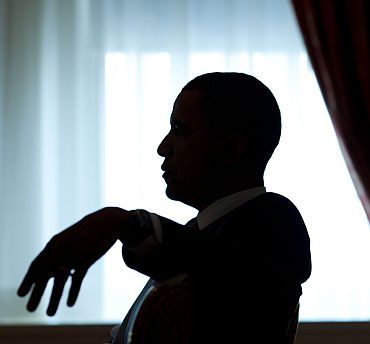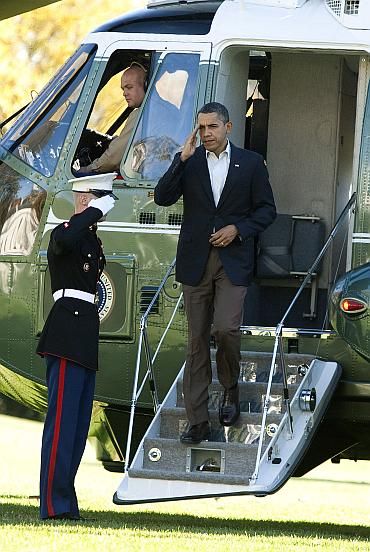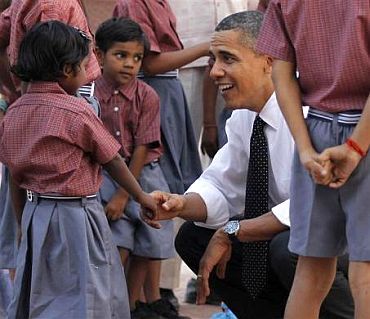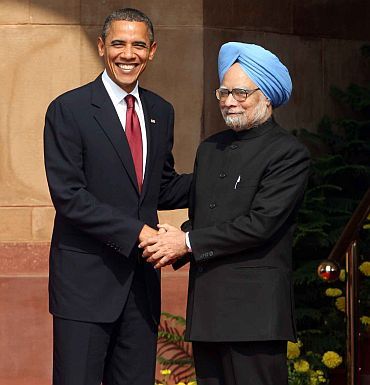Aziz Haniffa in Washington DC
Ed Luce, Washington bureau chief of The Financial Times, has said that US President Barack Obama's endorsement of India's candidacy for a permanent seat on the United Nations Security Council was a "cheap price" he had to pay to appease New Delhi of its concerns over his administration's policy towards India.
Speaking at a panel discussion on "Unlocking the Full Potential of the US-India Relationship," organised by the Centre for Strategic and International Studies, Luce declared that Obama's visit to India in November was "an unexpectedly successful trip."
"The fact that India was so pleased to get America's endorsement of its aspirations to be a permanent member of the United Nations Security Council and this could be a bouncing cheque as Strobe Talbott (former deputy secretary of state in the Clinton administration) put it, because Americans are in no position to guarantee this," he said.
...
'It was a great surprise just how successful a trip this was'
Luce reiterated that he believed "it was a great surprise just how successful a trip this was, but also relatively speaking, what a cheap price President Obama had to pay in order to demonstrate to the Indians that this was a full-fledged commitment from the US."
"It didn't involve any sort of material commitments -- anything other than just a vague aspiration that when it happens (UNSC permanent membership expansion) one day, we will be right behind you," he added.
However, Luce said that although it was "a very successful trip, but what it portends though is a little more ambivalent. There are still all sorts of issues where the US and India don't see eye to eye -- Afghanistan is obviously one of them."
On Pakistan, he said, "They are seeing eye-to-eye in that it's a hopeless destabilising situation and what the hell do we do about it -- and on a range of other issues, trade included, there are big divergences of interest."
'There are broader issues here'
But, another panelist, Karl F Inderfurth, who is the first occupant of the Wadhwani Chair on Indian Studies at CSIS, took strong exception to Luce's cynicism over Obama's endorsement of India's bid to be a permanent member of the UNSC.
Inderfurth argued, "Neither President (George W) Bush, who was a great friend of India nor President Clinton, would step up to that -- (but) President Obama did."
"And, he did it not only because India wanted to see that as a full recognition of the role the United States sees for India in the 21st century, but there are broader issues here is and goes to reforming the United Nations Security Council to reflect the realities of the 21st century -- not 1925."
'The UNSC is still an island of privilege'
Inderfurth, former Assistant Secretary of State for South Asian Affairs in the Clinton administration, said: "The UNSC is still an island of privilege. We got a 192 members of the UN, 15 member on the Security Council and five permanent members and it's been that way for a very long time and many people want to see the UN Security Council enlarged to reflect the realities of the 21st century."
He argued that "if you are going to do that, India has to be on the Security Council as a permanent member -- I mean, look at all of the factors, population, economy, and all the contributions to the UN."
"So, I would like to see President Obama's decision to do that (endorse India's candidacy) as one that it looking at US interests because this is a democracy -- a multi-ethnic great democracy -- and it's good to have them on the Security Council. We have some on the Security Council right now, we don't work very well with."
'India, despite its rise, is still a developing country'
He agreed with Luce that India faces many challenges, least of all being alleviating poverty and raising the level of education and health disparities and "the tremendous infrastructure problems."
Inderfurth said, "India, despite its rise, is still a developing country, and the Indians know that they've got to deal with that if they are going to rise to their full potential. They have things that they need to do at home to fully develop their country."






article